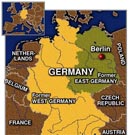German nuclear waste transport arrives at destination
 Gorleben, Germany - Fierce protests accompanied the arrival of a shipment of radioactive waste at a northern German long term storage site early Tuesday, one day behind schedule as thousands of anti-nuclear activists tried to hold up the transport.
Gorleben, Germany - Fierce protests accompanied the arrival of a shipment of radioactive waste at a northern German long term storage site early Tuesday, one day behind schedule as thousands of anti-nuclear activists tried to hold up the transport.
After more than 80 hours by train and truck, 11 containers with spent nuclear fuel from German nuclear power plants arrived at Gorleben in Lower Saxony at 0:17 am (2317 GMT).
Police said the protests, which also accompanied each of the 10 pervious transport operations, were more violent than usual. Protestors had tried to undermine a railway, chained themselves to concrete blocks on the railtrack and shot signalling flares at a police helicopter.
About 1,000 protesters who blocked the entrance to the warehouse at the storage site were carried away one by one by riot police.
Environment Minister Sigmar Gabriel criticized the protests, saying blocking the railway was "not acceptable." Rainer Wendt, chairman of the police union, slammed the careful tactics employed by the police.
"The state made to look foolish by the anti-nuclear activists," he said.
The activists urged the government to to quit nuclear energy and announced further protests against a possible additional storage site at Gorleben.
The protestors, who reject nuclear power as unsafe, aim to draw attention to the issue by disrupting the convoys. Under legislation, Germany is to close all its nuclear power plants within the next 15 years.
Disputes arose over the radiation emitted from the waste containers, which are of a new type, code-named TN 85, with shells designed to withstand greater heat from the high-grade waste, the remains of uranium fuel rods used in German nuclear power stations.
The environmentalist group Greenpeace charged that neutron radiation from the containers was 40 per cent greater than from the old containers, while officials said tests showed the radiation was within legal limits.
The containers left for the last leg of their trip, which began at a reprocessing plant in La Hague, France, from a train terminal where they were transferred to trucks.
Hundreds of police accompanied them on the final 20 kilometres of their journey, the road blocked by protestors at a number of locations. (dpa)